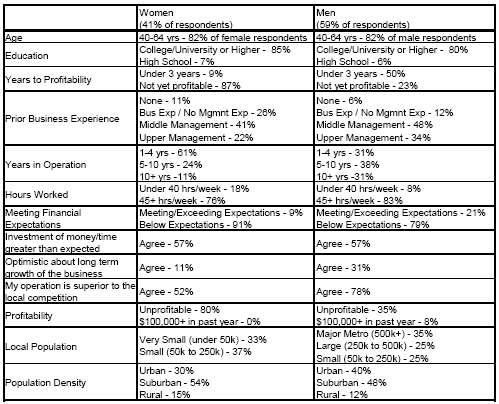There is considerable documentation through this report that many franchise owners are unhappy with their current situation and are contemplating changes to their career.
While some of this dissatisfaction can be attributed to a poor business climate, this report documents many areas that are more controllable. For example, many franchisees report dissatisfaction with most aspects of their relationship with their franchisor. Satisfaction ratings rarely exceed 55% and many rating categories receive satisfaction ratings in the teens. The exceptions to this are new store and pre-opening support, both of which are of short duration and received some of the best satisfaction ratings. It appears that many franchisors may be more effective at providing this shorter duration support to newer franchisees than they are at providing ongoing support.
A majority of respondents feel that the services provided by their franchisor are poor, and that the franchisor does not understand what it takes to be successful at the franchisee level. While there may be a valid difference of opinion on what is needed to be successful within a franchise, franchisors should take note that many of these franchisees would not be prepared to provide a positive franchise referral to prospective franchisees. When it comes to business generation through marketing, advertising, the Internet and in store materials, most respondents also gave their franchisor low ratings.
The bottom line is that many current franchisees appear to be contemplating or actively preparing for a career change. Only 16% of respondents anticipate continuing to operate their franchised business five years from now. While some of these individuals may choose to remain in franchising, we anticipate that the franchise industry will need to embark on a major recruitment drive to attract new recruits to the industry.
Regardless of the reason, an infusion of new franchisees will be a necessity simply to maintain the current industry infrastructure and revenues. Anything less will result in a contraction for affected companies within the industry. To prevent such a contraction within a specific franchise, there needs to be a focus on services most important to attracting and supporting newer franchisees.
Support requirements for new franchisees can be quite different than what is required by their more seasoned counterparts. More specifically, newer franchisees tend to require more (initial) training as they learn their new business. New franchisees rely on franchise newsletters (and other communications) to learn about industry best practices. They are learning new, and often proprietary, computer software. And new franchisees are cost conscious after investing significant sums of money to open a new business.
The accompanying table highlights types of ongoing support (as opposed to the shorter duration new franchisee support) from our survey that we feel are most important to the new franchisee.

This table shows that just 55% of respondents report receiving access to training manuals or tutorials. This does not mean that 45% of respondents do not receive training. It does mean that training may be less formal, possibly limited to verbal instruction, and most likely lacking in resources for future reference.
We have found that franchisees are dissatisfied with some types of ongoing support that we feel are most important to the new franchisee. Only 12% of respondents report that their franchise newsletter is a useful informational resource while 53% strongly disagree with the same statement. Overall, 21% of respondents feel that they received any form of training that helped them to be successful. Technology services are considered adequate by 27% of respondents and vendor programs are considered useful by 18% of respondents.
Franchisee support can vary widely among franchisors as can the fees paid by franchisees for this support. Franchisees paying higher fees are more likely to expect a greater level of support. Those who pay lower fees are more likely entitled to and receive lower levels of support. Regardless, lower levels of satisfaction with the support that is being provided is an indicator that some change is warranted.
As franchisors determine their need to recruit new franchisees to replace those leaving their system, it is the above mentioned areas that we feel will need to be addressed to best support these new business owners.
------
This article is a reprint from FranchiseFacts' Franchisee Satisfaction Survey Annual Report 2010 - Survey Results and Analysis. Perry Shoom is the founder of FranchiseFacts - a research firm that conducts private and public research for the Franchise Industry. The 2011 Franchisee Survey is in progress at www.FranchiseFactsUSA.com. If you are a franchise owner or store manager, please participate. FranchiseFacts does not disclose identifying information that may be provided by survey respondents. Your participation in a FranchiseFacts survey means that you can honestly and openly communicate your responses without disclosing your identity to third parties. FranchiseFacts is an Approved Survey Vendor for IAFD



